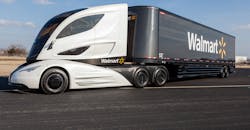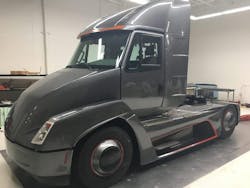Short haul trucks typically cover routes under 250 miles, and more than half of the shipments moved in the U.S. fit into this category.
At a recent Tesla shareholder’s meeting, Chief Executive Elon Musk revealed that details about the Tesla Semi electric truck would be coming out in September. We are still a little early but the buzz has increased even as Tesla begins shipping its lower-priced Model 3.
Tesla isn’t the only company venturing into the trucking space. In fact, Cummins, just unveiled a 140 kWh electric system for Class 7 heavy-duty trucks (see photo). It has a 100-mile range and can haul a 22-ton trailer. A hybrid with a diesel engine-based generator will extend the range to 300 miles. Like the Tesla Semi, it targets the short haul market where routes are well known and within the limits of the hardware. Cummins does not build trucks, but it does build engines, so this announcement is more of a proof of concept but it does give Cummin’s truck building customers and interesting option.
The estimated range for the Tesla Semi is on the order of 200 to 300 miles. A conventional diesel semi can go for 1,000 miles on a tank of fuel. They will likely remain a solution for long haul trucking, but competition in the short haul market is likely to shift to electric in the long term.
Electric trucks offer many advantages compared to their gas and diesel counterparts. Electrics have lower emissions and operating costs because electric motors require less maintenance than an internal combustion engine. At this point electricity is less expensive than diesel or gasoline, and using solar power to charge truck batteries may be an option for some companies.
The downside is similar to considerations with electric vehicles: the cost and weight of the battery. That has been addressed for cars, as Telsa and others have proven, but they are still expensive. Electric car adoption is still a fraction of even the hybrid market, which is in turn a fraction of the overall automotive market. The big difference is that cars are bought individually, where customers usually do not have planned routes, although most electric cars will handle the average commute even now.
Part of the issue with trucks and batteries is the space required, as this affects the amount of cargo that can be hauled. If the batteries can be contained only in the cab, then this will be less of an issue; standard trailers would not require modification to be used with electric trucks.
Tesla will likely include some of their self-driving and advanced driver-assistance system (ADAS) support into any truck they build, but it is unlikely that self-driving trucks will be in the mix early on. On the other hand, platooning is a more likely scenario available in a shorter term. The lead truck in a convoy would have a human driver, but the trailing vehicles would not.
Other issues with the short haul space including lower income per mile compared to long haul routes, making the return on investment (ROI) lower for the Tesla Semi. Vehicles in this space tend to be kept longer, although turnover can be affected by how efficient and costly an electric truck will be compared to an existing fleet.
Fuel tends to be the largest cost (about 38%) of running a long or short haul truck. The reduced cost due to lower electricity costs may help offset the higher upfront costs due to the batteries. The remaining costs, such as driver wages and benefits, lease payments, and insurance would not change much.
Sales of electric trucks will be different than the consumer side where individual vehicle purchases are the norm. Evaluations of electric trucks are likely to be with a smaller number of vehicles but once a decision is made an entire fleet or portion of it would wind up being replaced.
Another consideration for electric trucks is the potential importance of battery swap technology. Trucks may be more amenable to this than cars because of an electric cab’s construction, as well as the types of drivers. Truck drivers require more training than the usual automotive consumer, and dealing with trailers will be more complex than swapping out a battery.
Electric truck adoption may easily outpace electric cars if the ROI difference is large enough. It remains to be seen what the real differences will be, but we may not have long to wait to find out the real costs and benefits.
Companies like Walmart, UPS, and FedEx are eying electric trucks. Likewise, truck vendors have been working in this area as well. It will be interesting to see if the Tesla Semi pushes out more information from these other vendors so as not to lose the eyes and ears of these big-name customers.
About the Author
William G. Wong
Senior Content Director - Electronic Design and Microwaves & RF
I am Editor of Electronic Design focusing on embedded, software, and systems. As Senior Content Director, I also manage Microwaves & RF and I work with a great team of editors to provide engineers, programmers, developers and technical managers with interesting and useful articles and videos on a regular basis. Check out our free newsletters to see the latest content.
You can send press releases for new products for possible coverage on the website. I am also interested in receiving contributed articles for publishing on our website. Use our template and send to me along with a signed release form.
Check out my blog, AltEmbedded on Electronic Design, as well as his latest articles on this site that are listed below.
You can visit my social media via these links:
- AltEmbedded on Electronic Design
- Bill Wong on Facebook
- @AltEmbedded on Twitter
- Bill Wong on LinkedIn
I earned a Bachelor of Electrical Engineering at the Georgia Institute of Technology and a Masters in Computer Science from Rutgers University. I still do a bit of programming using everything from C and C++ to Rust and Ada/SPARK. I do a bit of PHP programming for Drupal websites. I have posted a few Drupal modules.
I still get a hand on software and electronic hardware. Some of this can be found on our Kit Close-Up video series. You can also see me on many of our TechXchange Talk videos. I am interested in a range of projects from robotics to artificial intelligence.



